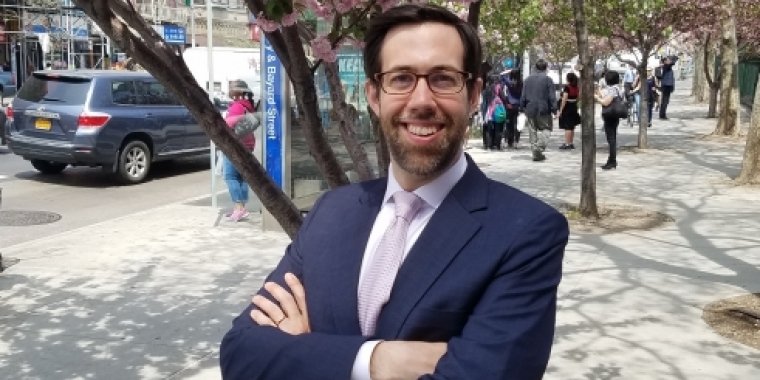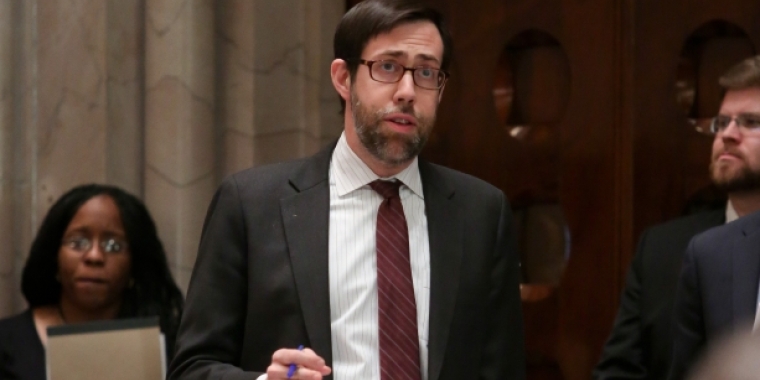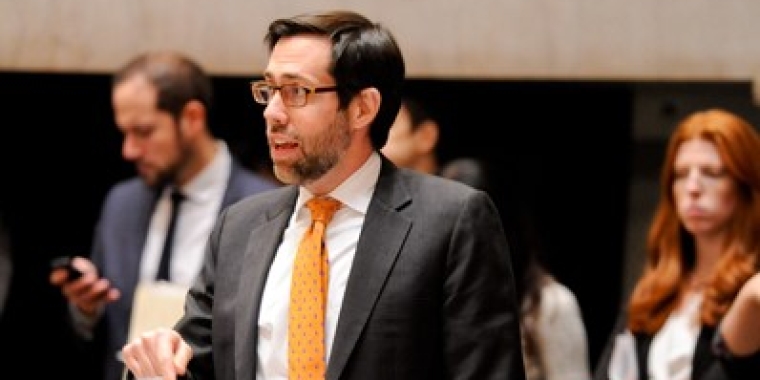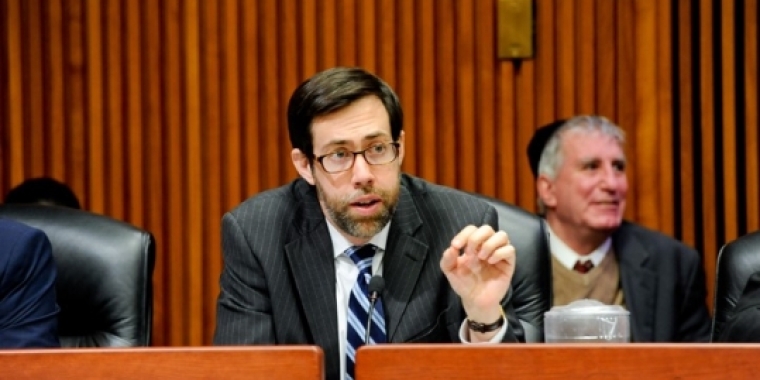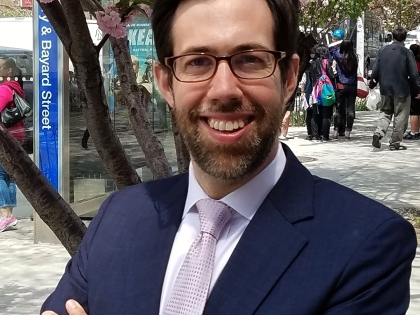
Squadron, Aubry Introduce Kalief's Law to Fix “Speedy Trial” Rules in NYS
Daniel L. Squadron
June 17, 2015
Broken System Forces Defendants to Endure Significant Delays Before Trial
Electeds: The Experience of Kalief Browder Must Be A Call To Action
ALBANY — State Senator Daniel Squadron and Assemblymember Jeffrion Aubry announced legislation (S.5988) to fix New York State's "speedy trial" law following the recent death of Kalief Browder, who spent three years in pre-trial detention at Riker's Island. Kalief's Law closes a legal loophole that forces defendants to endure significant delays before trial, even while in jail, despite the time limits established by law. This change will limit delays by prosecutors and the court, so that defendants are afforded their constitutional right to a speedy trial.
“Any system that jails the innocent for years at a time is both unjust and un-American,” said State Senator Daniel Squadron, Ranker on the Senate Codes Committee. "New York failed Kalief Browder. Nothing we do will undo the tragedy of his death, but his experience has to be a call to action. Kalief's incarceration was an outrage and the state law meant to guarantee his right to a speedy trial failed. We are introducing Kalief’s Law to reform the broken process that kept him in jail.”
“My heart and deepest condolences go out to the Browder family, but in the wake of their son’s death, we must offer much more than that – we must offer a solution. The injustice and degradation that Kalief Browder suffered while jailed in Riker’s for three years without a trial or conviction is shameful; it is an affront to what we regard as justice. The right to a speedy trial in criminal proceedings isn’t optional, it isn’t conditional: it’s constitutional,” said Assemblymember Jeffrion Aubry, Chairman of the Black, Puerto Rican, Hispanic and Asian Caucus. “I’ve said this repeatedly throughout this session: the time for rhetoric has passed. Every moment we sit in silence, every moment we surrender to complacency thousands of Kalief Browders are being churned through this broken system – thousands of inmates continue to sit in jail without Due Process – thousands of inmates fall victim to the inadequacies of the criminal justice system – many pay with their lives; this is unacceptable. The tragedy of Kalief Browder must never happen again, and I am proud to introduce Kalief’s Law with my Senate colleague Senator Squadron which would ensure that defendants receive a speedy trial. Integrity in the judicial and legal process must be restored and this is how we must do it.”
“Kalief Browder would have been pleased to know that his ordeal created a movement for change in our laws. In particular, the speedy trial law in this state too often allows prosecutors to circumvent the 'speedy trial clock' at the detriment of incarcerated defendants, who frequently are presumed guilty in our criminal justice system. Kalief Browder experienced this countless times throughout his three year prosecution by the Bronx County District Attorneys Office From 2010-2013. Instead of being tried expeditiously, he languished in jail without the opportunity to proclaim his innocence. This reform appears to significantly change the landscape, so that the rights of the accused are not trampled on, and there are more fair and just prosecutions going forward,” said Paul Prestia, Kalief Browder’s attorney.
"Kalief Browder was one of thousands of prisoners, presumed innocent, but jailed for years at Rikers Island waiting for their trials. Our current speedy trial law perversely enables this state of affairs. The two most critical shortcomings are: one, abuse of the 'ready rule,' by which prosecutors regularly stop the running of the speedy trial 'clock' by claiming to be 'ready' for trial when they are not: and two, the 'court congestion' exception, which can cause innocent individuals like Kalief Browder to spend extra years in jail due to 'court congestion' that they are in no way responsible for. The misuse of the speedy trial law is chiefly responsible for the existence of a long-term detainee population at Rikers Island. Enactment of the reforms in this bill could have a dramatic and lasting effect in reducing that population," said Tom O’Brien, author of “The Undoing of Speedy Trial in New York: the ‘Ready Rule’” in The New York Law Journal.
Kalief Browder was 16 years old when he was arrested in May 2010, accused of stealing a backpack. He was sent to Rikers Island and spent three years in pre-trial detention. Browder spent more than 700 days in solitary confinement and had 31 court dates. The charges were dropped against Browder in May 2013, and he was released. He committed suicide this month at the age of 22.
Despite the promise of a speedy trial guaranteed by the United States Constitution, New York’s current speedy trial statute has been ineffective. The statute mandates that the People be ready for trial within six months for felony charges; 90 days for Class A Misdemeanors; 60 days for Class B Misdemeanors; and 30 days for violations. Yet in 2013, in New York City defendants averaged waiting 594 days before going to trial.[1] In 2012, 55 percent of felony cases were pending for more than six months citywide.[2] Rikers Island holds about 11,000 inmates daily, with about 77,000 people cycling through in a year. Inmates held on bail or remanded to custody make up about 85 percent of the population at Rikers Island. [3]
Under current statute, prosecutors are allowed to declare “readiness” for trial simply by stating they are ready. At the very next court date, the People can declare themselves “not ready” and ask for an adjournment. Yet, even though it may take multiple weeks to get a court date, the prosecution is only clocked for the adjournment period it requested. Kalief’s Law will reduce undue delay by requiring the court to approve exclusions to the speedy trial clock. The bill will also ensure that a statement of “readiness” by the People is real by tying it to discovery, requiring the People to present evidence that they are in fact ready for trial, while allowing flexibility when the facts merit additional time.
[1] 2013 Annual Report, Criminal Court of the City of NY, http://www.courts.state.ny.us/COURTS/nyc/criminal/2013%20Annual%20Report%20FINAL%2072214.pdf
[2] “A Mayoral Agenda for Justice and Safety in New York City,” Toward a 21st Century City for All, 2013 - http://www.21cforall.org/content/mayoral-agenda-justice-and-safety-new-york-city
[3] What Is Happening at Rikers Island?” http://www.nytimes.com/2014/12/16/nyregion/what-is-happening-at-rikers-island.html
